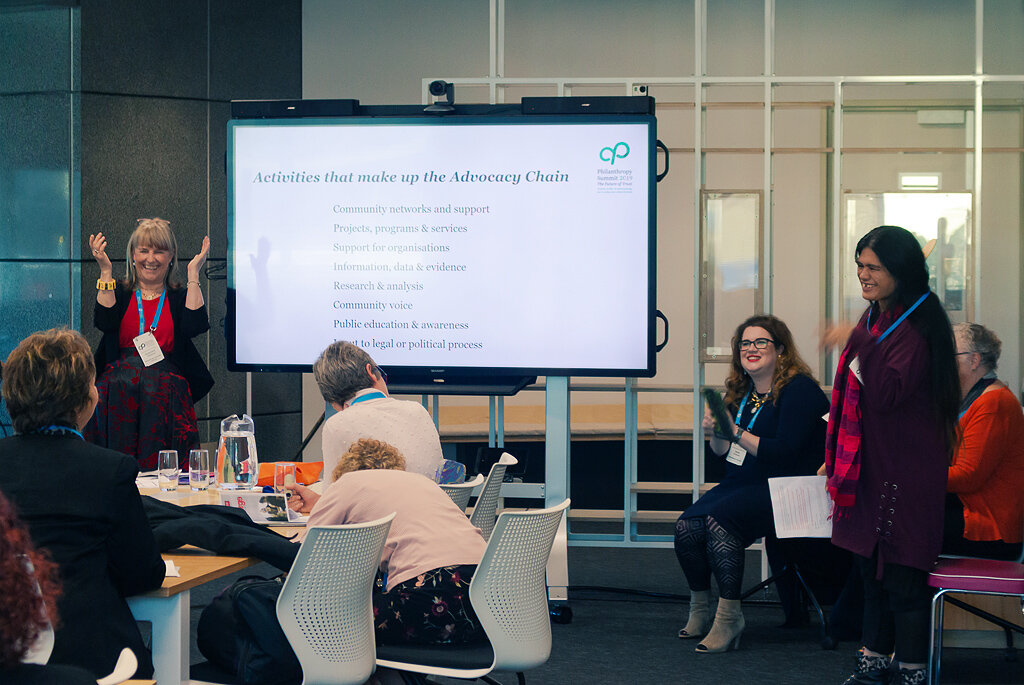The Advocacy Chain and Systems Change – Philanthropy Summit 2019
The J R McKenzie Trust hosted a breakout session on The Advocacy Chain and Systems Change. The discussion panel consisted of Kat’z Ruatara (Merge Community, Lifewise), Genevieve Timmons (Philanthropic Executive) Sarah Wickham (Philanthropy Australia) and Eileen Kelly (J R McKenzie Trust).
Discussion was open and commentary came thick and fast. The energy in the room was high. Attendees from the philanthropic sector demonstrated an obvious interest in the subject area and were passionate about the potential for positive outcomes.
The conversation was focused on how important advocacy is to grantmakers who want to see systems change and enduring social benefit. Panel members provided examples of how grantmakers can be part of supporting systems change without directly funding advocacy activities. They offered an opportunity to better understand how funded programmes can form part of the Advocacy Chain, where alignment and collaboration between grantmakers can create the greatest impact.
Genevieve opened with a statement that “advocacy was about being on the right side of history”. Sarah stated that there has been a significant increase of understanding of advocacy in Australia, with momentum building in recent years. The time was right for the development of capacity and capability in the sector.
Eileen provided an overview of advocacy as a means of ensuring that people have their voices heard and their wishes considered when decisions were made that affect them. She saw advocacy as “many voices working in harmony” and as a way of “amplifying that collective voice in order to be heard”. She drew the attention of participants to the recent Centre for Social Impact report on advocacy which was commissioned by J R McKenzie Trust. Entitled Voice, Influence, Action: Funding Advocacy for Impact, you can read it on the Trust’s website here.
Kat’z told her story as a peer advocate with lived experience. She talked about the importance of learning how to listen, but more importantly, learning how to hear what is being said. For her, advocacy was deeply rooted in whakawhanaungatanga; the process of establishing relationships and relating well to others.
Genevieve turned the conversation to how philanthropy can support advocacy in five different ways:
Providing funding for advocacy organisations
Contributing to advocacy projects
Designing and leading advocacy activities in-house
Convening and building advocacy collaborations
Taking a public position and a leading voice.
She led the discussion on the Advocacy Chain and described it as a helpful way for philanthropic organisations to understand the activities that can contribute to effective advocacy. It illustrates the range of options available for donors to invest their philanthropic dollars:
Community networks and support groups
Projects, programmes and services
Support for organisations
Information and evidence
Research and analysis
Community voice
Public education and awareness
Input to political or legal process and policy development.
Genevieve stated that “you should learn what everyone else is doing and choose where you want to get involved; it’s about being part of a ‘cascade of purpose’.”
Comments from the floor were insightful:
“To make long-term systemic change, advocacy is essential.”
“This is a high trust model; advocacy is in the realm of belief systems.”
“There is an unreal expectation that philanthropic organisations are the experts; the grantees are often the ones with the lived experience, and we should listen to them.”
“Often, philanthropic organisations are advocating unconsciously, without realising it.”
“We have a responsibility to build capacity and capability to support the development of confident and articulate advocates.”
“Communities are going to drive change; we have to weave communities throughout the advocacy chain.”
The discussion panel closed with a call for philanthropic organisations to be brave, work collaboratively, and embrace whakawhanaungatanga.




